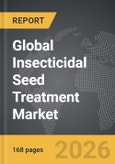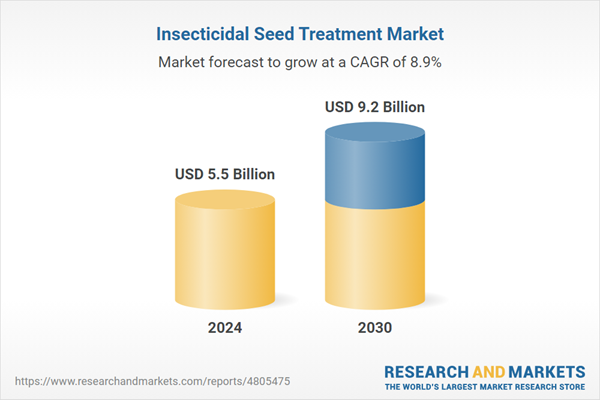Global Insecticidal Seed Treatment Market - Key Trends & Drivers Summarized
Why Is Insecticidal Seed Treatment Becoming Essential in Modern Agriculture?
Insecticidal seed treatment has emerged as a critical component in modern agriculture, offering an effective solution for protecting crops from early-stage pests that can significantly impact yields. By coating seeds with insecticidal compounds, farmers can ensure that crops are shielded from harmful insects from the moment they are planted, reducing the need for additional pesticide applications later in the growing season. This method not only provides targeted protection but also minimizes the environmental impact associated with conventional pesticide use. In an era where the agricultural sector is under increasing pressure to boost productivity while adhering to more stringent environmental regulations, insecticidal seed treatments are becoming an indispensable tool. The growing global demand for food, coupled with the challenges posed by climate change and evolving pest resistance, has further underscored the importance of these treatments in safeguarding crop yields and ensuring food security.How Are Technological Advancements Shaping the Insecticidal Seed Treatment Market?
Technological advancements are playing a pivotal role in the evolution of the insecticidal seed treatment market, driving innovations that enhance the efficacy and sustainability of these treatments. Recent developments in formulation technology have led to the creation of more effective and environmentally-friendly insecticidal coatings that offer prolonged protection against a broader spectrum of pests. These advancements are particularly important as farmers seek to combat the growing issue of pest resistance, which threatens the effectiveness of traditional pesticides. Additionally, the integration of seed treatment technologies with precision agriculture tools is enabling more targeted application, reducing waste and optimizing the use of chemical inputs. This precision is not only helping farmers achieve better crop outcomes but is also aligning with the broader industry trend towards more sustainable and responsible farming practices. As these technologies continue to advance, they are expected to further drive the adoption of insecticidal seed treatments across various crops and regions.What Role Does Industry and Consumer Demand Play in Shaping the Market?
Industry and consumer demand are significant factors influencing the growth of the insecticidal seed treatment market. The agriculture sector's increasing focus on sustainability and productivity has led to a greater emphasis on integrated pest management (IPM) strategies, where insecticidal seed treatments play a crucial role. These treatments offer an attractive solution for farmers looking to reduce their reliance on foliar sprays and other broad-spectrum pesticides, which can have negative environmental and health impacts. Furthermore, the rising consumer awareness of food safety and the demand for sustainably produced food are pushing agricultural producers to adopt practices that minimize chemical residues in food products. This shift in consumer preferences is encouraging more farmers to integrate insecticidal seed treatments into their pest management programs, as these treatments help reduce the overall chemical load on crops. Additionally, the agricultural industry's ongoing efforts to enhance crop resilience and productivity, especially in the face of climate change, are further driving the demand for effective seed treatment solutions.What Are the Key Drivers Fueling the Growth of the Insecticidal Seed Treatment Market?
The growth in the insecticidal seed treatment market is driven by several factors closely linked to technological advancements, evolving agricultural practices, and changing consumer behavior. One of the primary drivers is the increasing need for effective pest control solutions that align with sustainable farming practices. As farmers seek to improve crop yields while minimizing environmental impact, insecticidal seed treatments offer a targeted and efficient approach to pest management. The ongoing development of more advanced and environmentally-friendly seed treatment formulations is also contributing to market growth, as these innovations address concerns over pest resistance and the need for reduced chemical inputs. Additionally, the rising demand for high-quality, sustainably produced food is pushing agricultural producers to adopt practices that align with consumer expectations, further driving the adoption of insecticidal seed treatments. The expansion of precision agriculture technologies, which allow for more precise and efficient application of seed treatments, is another key factor fueling market growth. As these trends continue to evolve, the insecticidal seed treatment market is expected to experience sustained expansion, driven by the need for effective, sustainable, and consumer-friendly pest management solutions.Report Scope
The report analyzes the Insecticidal Seed Treatment market, presented in terms of market value (USD). The analysis covers the key segments and geographic regions outlined below.- Segments: Type (Chemical, Biological); Crop Type (Cereals & Oilseeds, Fruits & Vegetables, Other Crop Types); Form (Liquid, Powder).
- Geographic Regions/Countries: World; United States; Canada; Japan; China; Europe (France; Germany; Italy; United Kingdom; Spain; Russia; and Rest of Europe); Asia-Pacific (Australia; India; South Korea; and Rest of Asia-Pacific); Latin America (Argentina; Brazil; Mexico; and Rest of Latin America); Middle East (Iran; Israel; Saudi Arabia; United Arab Emirates; and Rest of Middle East); and Africa.
Key Insights:
- Market Growth: Understand the significant growth trajectory of the Chemical Treatment segment, which is expected to reach US$5.6 Billion by 2030 with a CAGR of 8.3%. The Biological Treatment segment is also set to grow at 9.8% CAGR over the analysis period.
- Regional Analysis: Gain insights into the U.S. market, valued at $1.5 Billion in 2024, and China, forecasted to grow at an impressive 12.6% CAGR to reach $2 Billion by 2030. Discover growth trends in other key regions, including Japan, Canada, Germany, and the Asia-Pacific.
Why You Should Buy This Report:
- Detailed Market Analysis: Access a thorough analysis of the Global Insecticidal Seed Treatment Market, covering all major geographic regions and market segments.
- Competitive Insights: Get an overview of the competitive landscape, including the market presence of major players across different geographies.
- Future Trends and Drivers: Understand the key trends and drivers shaping the future of the Global Insecticidal Seed Treatment Market.
- Actionable Insights: Benefit from actionable insights that can help you identify new revenue opportunities and make strategic business decisions.
Key Questions Answered:
- How is the Global Insecticidal Seed Treatment Market expected to evolve by 2030?
- What are the main drivers and restraints affecting the market?
- Which market segments will grow the most over the forecast period?
- How will market shares for different regions and segments change by 2030?
- Who are the leading players in the market, and what are their prospects?
Report Features:
- Comprehensive Market Data: Independent analysis of annual sales and market forecasts in US$ Million from 2024 to 2030.
- In-Depth Regional Analysis: Detailed insights into key markets, including the U.S., China, Japan, Canada, Europe, Asia-Pacific, Latin America, Middle East, and Africa.
- Company Profiles: Coverage of players such as ADAMA Agricultural Solutions Ltd., Advanced Biological Marketing, Bayer CropScience AG, BioWorks, Inc., BrettYoung and more.
- Complimentary Updates: Receive free report updates for one year to keep you informed of the latest market developments.
Some of the 31 companies featured in this Insecticidal Seed Treatment market report include:
- ADAMA Agricultural Solutions Ltd.
- Advanced Biological Marketing
- Bayer CropScience AG
- BioWorks, Inc.
- BrettYoung
- Compass Minerals International, Inc.
- Germains Seed Technology Inc.
- INCOTEC Group BV
- Lanxess AG
- Monsanto Company
- Novozymes A/S
- Nufarm Limited
- Plant Health Care, Inc.
- Precision Laboratories LLC
- Syngenta AG
- Valent U.S.A Corporation
- Verdesian Life Sciences
This edition integrates the latest global trade and economic shifts into comprehensive market analysis. Key updates include:
- Tariff and Trade Impact: Insights into global tariff negotiations across 180+ countries, with analysis of supply chain turbulence, sourcing disruptions, and geographic realignment. Special focus on 2025 as a pivotal year for trade tensions, including updated perspectives on the Trump-era tariffs.
- Adjusted Forecasts and Analytics: Revised global and regional market forecasts through 2030, incorporating tariff effects, economic uncertainty, and structural changes in globalization. Includes historical analysis from 2015 to 2023.
- Strategic Market Dynamics: Evaluation of revised market prospects, regional outlooks, and key economic indicators such as population and urbanization trends.
- Innovation & Technology Trends: Latest developments in product and process innovation, emerging technologies, and key industry drivers shaping the competitive landscape.
- Competitive Intelligence: Updated global market share estimates for 2025, competitive positioning of major players (Strong/Active/Niche/Trivial), and refined focus on leading global brands and core players.
- Expert Insight & Commentary: Strategic analysis from economists, trade experts, and domain specialists to contextualize market shifts and identify emerging opportunities.
Table of Contents
Companies Mentioned (Partial List)
A selection of companies mentioned in this report includes, but is not limited to:
- ADAMA Agricultural Solutions Ltd.
- Advanced Biological Marketing
- Bayer CropScience AG
- BioWorks, Inc.
- BrettYoung
- Compass Minerals International, Inc.
- Germains Seed Technology Inc.
- INCOTEC Group BV
- Lanxess AG
- Monsanto Company
- Novozymes A/S
- Nufarm Limited
- Plant Health Care, Inc.
- Precision Laboratories LLC
- Syngenta AG
- Valent U.S.A Corporation
- Verdesian Life Sciences
Table Information
| Report Attribute | Details |
|---|---|
| No. of Pages | 168 |
| Published | February 2026 |
| Forecast Period | 2024 - 2030 |
| Estimated Market Value ( USD | $ 5.5 Billion |
| Forecasted Market Value ( USD | $ 9.2 Billion |
| Compound Annual Growth Rate | 8.9% |
| Regions Covered | Global |









